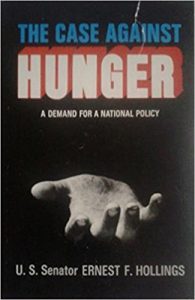To the editor:
Thank you for drawing attention to the continuing problem of hunger. Years ago, state senator Isadore Lourie said that Senator Hollings “put a spotlight on that issue probably as the only man in the state at that time that could have done it. … He had the prestige and the stature and a tremendous political following in the state. I think through that mechanism and through the force of his dynamic personality, he was able to get the conscience of South Carolinians stirred up and concerned.”
 Jan. 10, 2018, will mark the 50th anniversary of Hollings’s first hunger tour. With help from leading black South Carolinians like I. D. Newman and Jim Clyburn, Hollings toured poor neighborhoods throughout South Carolina. His earliest tours were made without any media presence as Hollings worked to educate himself about the conditions. He knew the poor would not talk openly in front of cameras and microphones and he was afraid the tours might be seen by some as a publicity stunt.
Jan. 10, 2018, will mark the 50th anniversary of Hollings’s first hunger tour. With help from leading black South Carolinians like I. D. Newman and Jim Clyburn, Hollings toured poor neighborhoods throughout South Carolina. His earliest tours were made without any media presence as Hollings worked to educate himself about the conditions. He knew the poor would not talk openly in front of cameras and microphones and he was afraid the tours might be seen by some as a publicity stunt.
In February 1969, Hollings’ dramatic testimony before a congressional Select Committee on Nutrition and Human Needs made headlines across South Carolina and the nation. Some were deeply embarrassed that the young senator had brought such negative attention to the Palmetto State and Hollings jeopardized his political career through his efforts to combat poverty and hunger. But, he framed the issue clearly.
“There is hunger in South Carolina. . . . there are literally hundreds of hungry families who never heard of food stamps. But perhaps this is a blessing, for if they did, they wouldn’t qualify anyway. They can’t afford the initial cost. … White or black, the poverty is the same. Bleak, hunger and hovel-housing amidst disease and ignorance. Again and again, no running water – hot or cold — no lights, no toilet facilities amidst filth and too little to eat.
“In many instances there is awareness of the problem. In most cases local and state public officials traveled with me, and they have tried. But there is a greater blight perhaps than poverty. That is the red tape worm of federal government…. This committee should set as a national goal the elimination of hunger and slum conditions in America … the federal red tape worm should be exterminated. … In other words, the government programs should be designed to maintain people and not buildings.”
His conclusion is one that many would embrace today.
— Herbert J. Hartsook, director, South Carolina Political Collections, Ernest F. Hollings Special Collections Library, University of South Carolina, Columbia, S.C.
- Sound off! What do you think about what we’re saying. Send a letter to the editor or comment to: editor@charlestoncurrents.com Our feedback policy.



 We Can Do Better, South Carolina!
We Can Do Better, South Carolina!
























